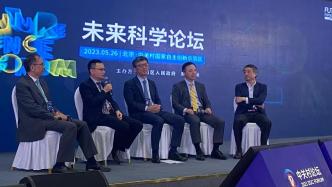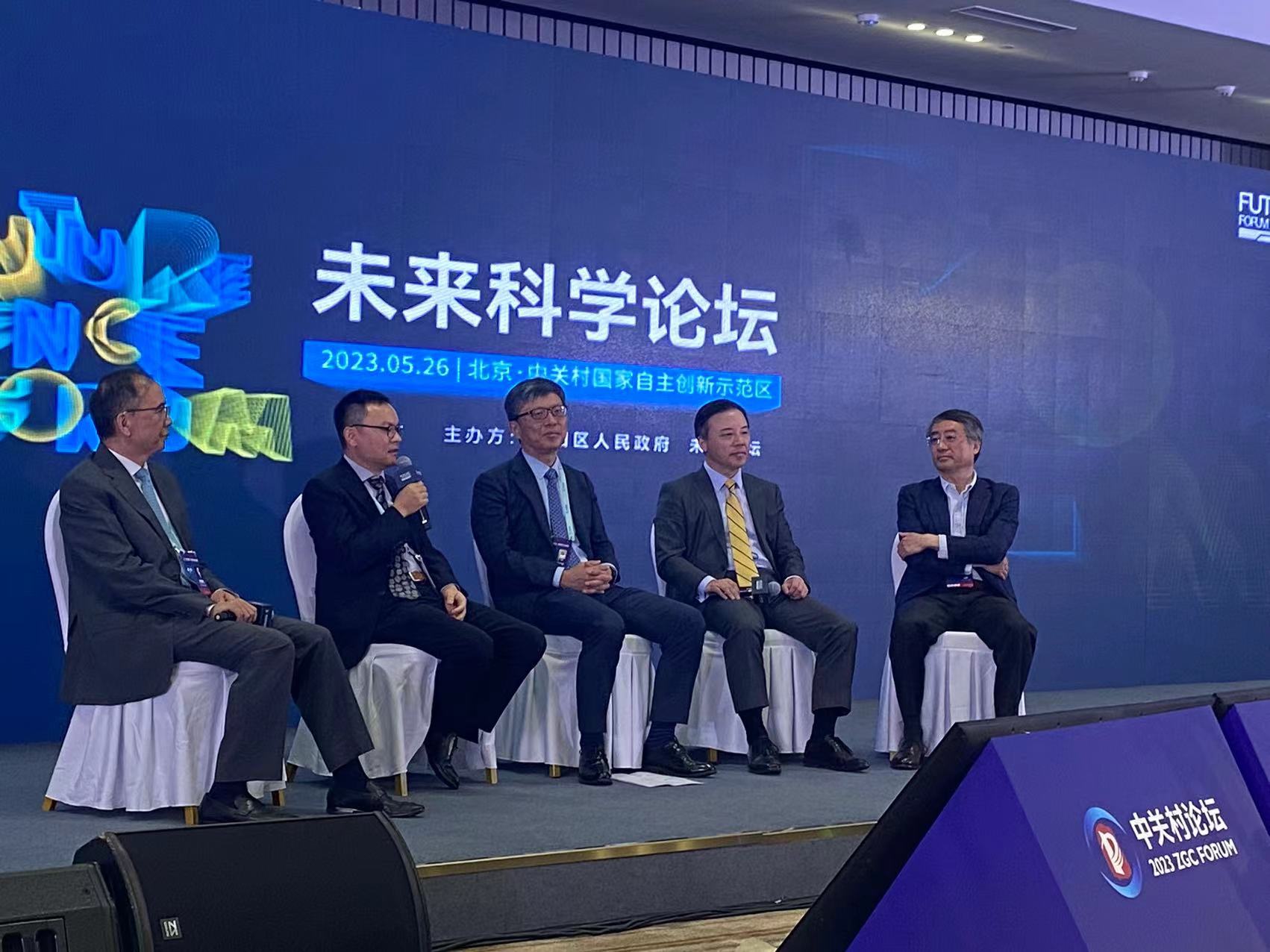
·Science lies in asking some simple, stupid and unconstrained questions. Science has penetrated into every aspect of human beings. Human beings need to maintain curiosity and the courage to ask stupid questions, and tolerate this courage. A closed, narrow, and borderless way of thinking is not conducive to the development of science, and it is even impossible to make interesting discoveries.

A group of investors and academicians discussed the nature, spirit and discovery of science from the source.
What is science? What is the connotation of scientific spirit? How can capital power better promote scientific development? How can colleges and universities adhere to the positioning of basic scientific research? On May 26, at the Future Science Forum, a parallel forum of the 2023 Zhongguancun Forum, a group of investors and academicians discussed the nature, spirit and discovery of science from the source. The forum is sponsored by Future Forum and Beijing Chaoyang District People's Government. It aims to advocate openness and cooperation in science, build a bridge between science and all sectors of society, and inspire and support a new generation of young scientists to carry out creative, breakthrough and subversive research.
What is science?
With the rapid development of science and technology today, how to understand the spirit of science? Shen Xiangyang, the 2022 rotating chairman of the Future Forum Council, double-appointed professor of the Institute for Advanced Study of Tsinghua University, and foreign academician of the National Academy of Engineering of the United States, said that the connotation of the scientific spirit is rich. First, science is a very rational thing, and we should treat and study science with a rational attitude. Second, science can verify whether a thing is true by repeating experiments. Third, you must have a critical spirit to do science. The process of continuous scientific progress is to deny the process of previous explorations. If everyone believed that Newton was correct, there would be no Einstein. Fourth, the scientific spirit is the spirit of courage to explore, and the exploration of new scientific fields is a long-term accumulation process.
Wang Qiang, director of the Future Forum and co-founder of ZhenFund, said that the scientific spirit emphasizes openness and tolerance, and it is closely related to the history of scientific evolution and the history of human evolution. From the closed universe of Newton in modern times, to the open universe of modern science, to the parallel universe imagined now, the way of thinking, the world view, and the universe of human beings are moving towards openness. The spirit behind this kind of science must call for openness. A closed, narrow, and borderless way of thinking is definitely not conducive to the development of science, and it is even impossible to make interesting discoveries.
Wang Qiang said that in the process of human evolution, a strong collaboration has been developed, and collaboration has become the kinetic energy, tool and gene of evolution. If there is no collaboration at the level of human knowledge, collaboration at the technical level, and collaboration at the engineering level, there will be no material today. civilization. Collaboration needs to cross the boundaries of imagination, creation, and the boundaries between basic sciences such as material science, life science, engineering science, and applied science. It is the core of human evolution history. Cross-border cooperation is not only necessary but also inevitable Yes, and it's universal. "Today we put special emphasis on carrying forward the connotation of the scientific spirit. In fact, we are returning to such questions. Who are human beings? Where did we come from? How did we get to today? Where are we going in the future?" He said, if we can ensure openness and imagination , Guaranteed imagination and creativity, human beings will not fall behind.
Zhang Xiang, president of the University of Hong Kong, academician of the US National Academy of Engineering, and foreign academician of the Chinese Academy of Sciences, said that science is an important part of spiritual civilization. It is truth-seeking, realistic, and fault-tolerant, which are very much needed factors in all aspects of society. The essence of science is exchange and openness, and society must be inclusive of scientists and scientific research, which is determined by the nature of science. In a scientific experiment, 95% of the time is a failure, and the last 5% of the time is a success, and the 95% of the time that fails requires tolerance. Doing research requires both purposeful and unconstrained projects. Science requires unconstrained thinking, because many scientific discoveries are not made by following a goal, but are sought when there is no goal.
Liu Qin, the 2023 rotating chairman of the Future Forum Council, the foundational donor of the Future Science Award, and the founding partner of Wuyuan Capital, said that science comes from human curiosity. Just like Newton asked why apples fell, science is all about asking simple, stupid and wild questions. Science has penetrated into all aspects of human beings. Human beings need to maintain curiosity and the courage to ask stupid questions, and tolerate this courage. "The further science goes to the deep water area, the more it needs to return to its original intention, which is tolerance and openness." At the same time, As science enters the deep-water area, interdisciplinary research is becoming more and more common, and interdisciplinary research requires openness and communication.
no money no technology
"Speaking of money hurts feelings, no money and no technology." Shen Xiangyang said that to do technology, you must have capital. There are four different forms of scientific and technological innovation. One is technological innovation, which is represented by government funds; the second is mission-based innovation, which spares no effort to invest in innovation and does not care about commercial value; innovation. "Public welfare forces can provide a huge supplement. A very effective way is to support our university more."
How can the power of private public welfare capital better promote scientific development? Liu Qin said that in venture capital, it is necessary to spend more time or have a greater tolerance for risk before it is possible to make subversive business explorations in exchange for commercial returns. It is required that a venture capital be obtained within two or three years. Payback is out of the question. The same is true for scientific and technological innovation. Science requires more tolerance and longer-term planning. The source of scientific and technological innovation comes from basic scientific research. If basic scientific research is eager for quick success, it will be difficult to obtain proper resource support.
Today, science needs to find a way to connect with the industry. Scientists devote part of their energy to doing industry-university-research research, so that they can transform pure curiosity and scientific research into industries and products and services that ordinary people can feel. Liu Qin said, "We have to find a way to do two things in industrial investment. First, we must try our best to transform scientific and technological innovation into production, education and research, which can improve the overall welfare of the society and business progress. Second, consciously and actively abandon some financial resources. The rewards and appeals from the Internet, and truly use part of the funds to feed back science. This kind of feedback should use a scientific evaluation system, not a financial return system. Only when we do this kind of feedback and mutual promotion can scientific research not be a source of water , and will not make industrial research lack the source support of basic science."
But "funds are never enough," Liu Qin said. The key to solving the problem of funding sources and sustainable development is to introduce a sustainable fund with a hematopoietic mechanism, allowing the fund to self-generate and distribute bonuses. This is the operation method of many foundations around the world. To achieve credibility, a sustainable fund must introduce a healthy and transparent mechanism to expand the influence of the fund. At the same time, it must gather a group of people with both emotional and professional financial management capabilities, so that the hematopoietic mechanism can truly play a role. The rest of the work should be handed over to colleges and universities. Colleges and universities have scientific literacy and vision, and allocate funds to unconstrained scientists to form a benign interaction.
Zhang Xiang said that the University of Hong Kong generally conducts evaluations every 6 years, and 4 papers must be published in 6 years. There is less urgency, less distraction, so it is easy for some professors to do some long research. At present, various countries compete fiercely in terms of talent and innovation. Today, when we are solving the "stuck neck" problem, others are already researching the next "stuck neck" technology. How to get ahead of time? He believes that to make subversive innovations at the source, the society should strongly support original innovations, basic scientific research, and unconstrained style.
